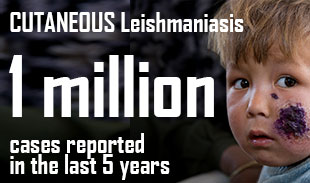Community-driven programme is key to defeating visceral leishmaniasis in Bangladesh
4 December 2017 | Dhaka | Geneva −−Bangladesh is close to eliminating visceral leishmaniasis as a public health problem by 2020, with only 159 new cases in 2016, compared with more than 9 600 in 2006.
The spectacular achievement is the result of a combination of factors: strong community engagement, a motivated workforce, availability of medicine, easy-to-use diagnostics and an integrated vector control programme.
A recent monitoring mission evaluated the national programme’s overall impact.
Neglected tropical diseases course now accessible via eLearning
03 August 2017 | Geneva –– The first free, on-line course on a neglected tropical disease is now available to the public.
The course on post-kala-azar dermal leishmaniasis (PKDL) aims to help health workers and field practitioners recognize this form of the disease which is often misdiagnosed.
Anyone completing the course with a minimum score of 70% will be awarded a certificate.
WHO responds to visceral leishmaniasis outbreak in Kenya
26 June 2017 | Geneva | Nairobi ––The World Health Organization (WHO) has dispatched medical supplies to Kenya in response to an outbreak of visceral leishmaniasis in Marsabit County, with a population of over 290 000.
According to local media, four people have died as a result of this outbreak.
Visceral leishmaniasis: WHO publishes validation document as countries approach elimination
11 November 2016 | New Delhi | Geneva –– Three countries that were once highly endemic for visceral leishmaniasis are poised to eliminate the disease as a public health problem by 2020.
Bangladesh, India and Nepal have lowered the number of new cases and as the three countries approach elimination, WHO's Regional Office for South-East Asia has published the process to validate the elimination of this form of leishmaniasis.
WHO and Gilead Sciences extend collaboration against visceral leishmaniasis
27 September 2016 ¦ Geneva –– The World Health Organization (WHO) and Gilead Sciences have signed a new agreement that allows the pharmaceutical company to donate medicines for the treatment of visceral leishmaniasis.
Under the new 5-year collaboration and until 2021, Gilead Sciences have also agreed to provide financial assistance for the expansion of leishmaniasis surveillance and control.
Visceral leishmaniasis is endemic in more than 80 countries worldwide.
-
Global leishmaniasis update, 2006–2015: a turning point in leishmaniasis surveillance
Weekly epidemiological record -
Control of visceral leishmaniasis in Somalia: achievements in a challenging scenario, 2013–2015
Weekly epidemiological record - Manual on case management and surveillance of the leishmaniases in the WHO European Region
-
Community-driven programme is key to defeating visceral leishmaniasis in Bangladesh
4 December 2017 -
Neglected tropical diseases course now accessible via eLearning
3 August 2017 -
WHO responds to visceral leishmaniasis outbreak in Kenya
23 June 2017 -
Visceral leishmaniasis: WHO publishes validation document as countries approach elimination
11 November 2016
Upcoming events & meetings
Videos
"A trilogy of injustice" (trailer)
Photo gallery
Learn about the disease
Contacts
Dr José Antonio Ruiz Postigo
Leishmaniasis Control Programme
postigoj@who.int
+41 22 791 3870
+41 79 516 3882 (mobile)
Media contact:
Ashok Moloo
molooa@who.int
+41 22 791 1637
+41 79 540 50 86 (mobile)








